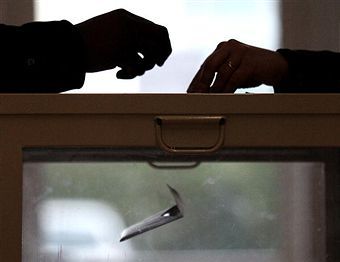 One of the key questions in any election is turnout: whose voters will turn up and whose
won’t. People are clearly disappointed in the political class – on a scale from 0 to 10, trust in politicians and parties is hovering around 3 points – but does it mean that they will stay at
home, spoil their ballots or opt for fringe parties and single-issue candidates? What about the talk of a hung parliament ? Will it make voters believe that their vote counts – and so bring them to
the polling stations — or make them stay at home, giving up on the idea that any change is possible?
One of the key questions in any election is turnout: whose voters will turn up and whose
won’t. People are clearly disappointed in the political class – on a scale from 0 to 10, trust in politicians and parties is hovering around 3 points – but does it mean that they will stay at
home, spoil their ballots or opt for fringe parties and single-issue candidates? What about the talk of a hung parliament ? Will it make voters believe that their vote counts – and so bring them to
the polling stations — or make them stay at home, giving up on the idea that any change is possible?
In the last three elections turnout was low, relatively speaking: 59 percent of the electorate voted in 2001 and 61 percent went to the polls in 2005. In all the elections between Andrew Bonar Law’s 1922 victory and New Labour’s defeat of the Conservatives in 1997, the average turnout was much higher. After World War II it was astronomic – 84 percent of Britons voted in 1950.
There are a couple of reasons for the downward trend. Since 1964 voters identify less and less with parties – since they don’t feel “at home” in parties they may be less inclined to vote. Second, young people are less likely to vote. The Electoral Commission reported that less than 60 percent of 17-24 year olds are even registered to vote. Finally, voters may be turned off by the “sameness” on offer; why bother voting if all the parties offer basically the same policies. In this election, when Labour have so blatantly stolen a number of ideas from the Tories this may appear particularly true.
A big question is who enthuses voters the most – and particularly undecideds, who may number as much as 12 million at this stage. Gordon Brown struggles to motivate his own Cabinet and senior aides, let alone Labour voters. David Cameron is doing well at this early stage of the campaign but has hardly created a British equivalent of Obamania. Then there is Nick Clegg. Though he will benefit from the presidential TV debates, I have yet to detect a great “Clegg is our man” groundswell.
An Ipsos/Mori poll projected likely voter turnout at 53 percent, almost a ten percent drop from the last election. My guess is that turnout will be depressed (55-60 percent) as voters have given up on politicians; that Labour will struggle to get their voters out; but that the Tories will get more of theirs to the polls – because of aggressive targeting and a sense among both their supporters and undecideds that a hung parliament is bad for Britain.






Comments